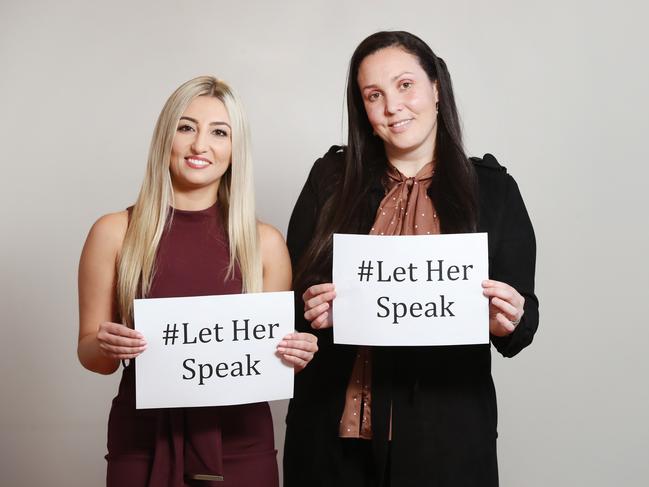#Let Her Speak: First sexual assault survivor speaks out in the NT as landmark gag law reform comes into effect
SEXUAL assault survivor Lavinia Duga has been advocating to change a Northern Territory law that gags victims. Today, she becomes the first woman to speak out under landmark new laws in the Territory.
Police & Courts
Don't miss out on the headlines from Police & Courts. Followed categories will be added to My News.
- #Let Her Speak: Sexual assault survivors welcome landmark new laws in the NT
- Editorial: #Let Her Speak: New laws a victory for sexual assault survivors after hard-fought campaign
- #Let Her Speak: Sexual assault survivors no longer silenced in the NT as landmark laws pass parliament
- NT Government set to repeal laws gagging sexual assault survivors
IN November 2017, Lavinia Duga reported to police that she had been raped by a soldier based at Robertson Barracks, while holidaying in Darwin a month earlier.
In a phone call recorded by police, the soldier admitted to sexually penetrating Lavinia despite hearing her repeatedly tell him “no”.
However charges were only laid over the incident after a second woman – who Lavinia has never met or spoken to – independently came forward several months later. She also reported that she had been raped by the same soldier, while visiting from out of town.
“Even now I still don’t know who the other woman is” says Lavinia. “I would just like to thank her for being brave in coming forward and speaking up about it.”

In 2019 the soldier was committed to stand trial over the two assaults, but – in a move which has frustrated survivor advocates – a judge then ruled that the cases should be tried separately as “the circumstance of the two alleged offences were separate and distinct” and there was nothing which, in his opinion, “serve[d] to link the two together.”
Karen Willis, Executive Officer of Rape and Domestic Violence Services Australia says the decision “defied common sense”.
“There is a bias in the criminal justice system, and over and over again, we see sexual offence trials like these separated. It means that jurors aren’t going to be given the whole picture, they are not going to be told the whole story, and that leads to acquittals and plea bargains.”
As predicted, the defendant then successfully pleaded down to a single count of indecent sexual assault.
In exchange, he was given a 12 month jail sentence, which was suspended immediately.
“He’s now a convicted sex offender, but he did not spend a single night in jail” says Lavinia. “I’m really worried he could do it again. It sends a dangerous message and I think it’s time for things to change.
Ms Willis says the case illustrates a number of problems with the criminal justice system.
“The law has let these women down. All of us should be horrified by Lavinia’s story and have absolute admiration for her bravery in coming forward. We shouldn’t rest until circumstances like hers never happen to anyone else ever again.”
In September last year, Lavinia contacted media hoping to at least be able to use her story to raise awareness about the impacts of the criminal justice system on sexual assault complainants.
But to her horror, Lavinia then discovered that even though the now-convicted sex offender would not see the inside of a jail cell, she potentially could.
Under Northern Territory legislation, it was a crime to publish the identity of any sexual assault survivor and anyone found guilty of breaking the law could face up to six months in jail, including Lavinia herself.
“I felt like I was being treated like I was a criminal” says Lavinia. “Women should be allowed to speak publicly if they want to.”
MORE ON THE #LET HER SPEAK CAMPAIGN
Let Her Speak series on NT sexual assault victim gag laws in NT News lands journalist a Walkley
Editorial: Filmmaker risks jail for documentary
Lavinia, who is now studying criminology and law, also discovered that because the gag-law prevented her from being identified, it also prevented her from speaking openly about her criticisms of the criminal justice system
“The principle of open justice is paramount in Australia” says Dr Rachael Burgin, chair of Rape and Sexual Assault Research and Advocacy.
“One impact of legally silencing survivors is that the law prevents the public from hearing about the experience of survivors during the process of justice itself. It means we’re not holding the legal system to account.”
In response, in 2019, Lavinia joined the #LetHerSpeak campaign to amend the NT’s archaic sexual assault victim gag-laws.
Today, the law has officially changed to allow survivors to self-identify in media provided they are over 18, consent to be named in writing, and meet various other criteria.
“For me it is important to be named because it gives you strength,” says Lavinia, who has become the first person to speak out under the new laws.
“We should not accept injustice. I want to focus on helping women and on the criminal justice system because there’s a lot of work that needs to be done.”
LIMITED TIME: New NT News subscription offer: $1 a week for the first 12 weeks
If you or someone you know has been impacted by sexual violence, support is available by calling 1800 RESPECT on 1800 737 732.

LAVINIA DUGA: IN MY OWN WORDS
I remember the night before you raped me, I made it clear from the start and told you I don’t want to have sex because of my religious views. I told you that you need to find someone else if that’s what you want and you didn’t respond. You sat there and said nothing.
I thought I was safe around you because I knew your family and many of your friends.
The day you raped me, you kissed me and then tried to pull my dress up and I immediately said “No”. You told me to take your pants off and I said “No”.
I made it clear I didn’t want to take it any further.

But you didn’t stop there. Your hand went up my dress. I grabbed your wrist and we were fighting. It felt like an arm wrestle. I remember trying to get up but you held me down and forced yourself on me.
The whole time you didn’t say a word back to me. I kept saying “No” but you just didn’t care. I yelled “It hurts” and you finally let me go.
You got off me and pretended nothing had happened. I got up and walked into the bathroom. I couldn’t stop shaking and just looked in the mirror. This is when I first told myself I had to report you to the police.
When I arrived home, I tried to tell you how this affected my life through text messages. I questioned why you held me down. You said “How did I pin you down? You go to the gym every day, I would’ve noticed if you were struggling”.
I told you I was bruised and you responded that maybe I “bruise easy”. You kept making excuses for your actions, saying things like “You didn’t say no loudly” or you thought that I was just being “cheeky”.
Later, my doctor diagnosed me with anxiety, depression and post-traumatic stress disorder.
I now understand how broken the legal system is. I know what I want to do with the rest of my life. I want to continue to help women and children. The system needs to change.


